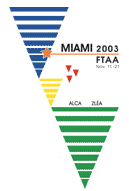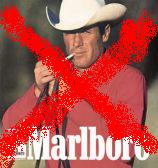Health
Before Trade:
TOBACCO OUT OF THE FTAA!



Tobacco is a product like no other, in that it kills if used as intended. On November 20-21, 2003, trade representatives of the U.S. and 33 other countries throughout the Americas will meet in Miami, FL for the next round of negotiations on the Free Trade Area of the Americas (FTAA). The stated purpose of the FTAA is to eliminate barriers to trade and investment between these countries. But when it comes to tobacco, more trade = less health! The FTAA poses a major threat to efforts to protect the lives and lungs of people throughout the Americas from profit-hungry tobacco corporations. The best way to avoid this threat would be to exclude tobacco from the scope of the FTAA!!
READ REPORT ABOUT TOBACCO-RELATED EVENTS IN MIAMI
Tuesday, November 18, 2003
RALLY/PRESS
CONFERENCE
IN FAVOR OF EXCLUDING TOBACCO FROM THE FTAA !
| WHEN: | 12 noon - 1pm | |
| WHERE: |
Torch
of Friendship |
|
| SPEAKERS: |
Robert
Weissman, Co-Director, Essential Action |
SPONSORED BY: Essential Action , Latino Issues Forum - Tobacco-Free College Campuses Project , San Francisco Tobacco-Free Coalition , Corpwatch , American Lung Association of Florida
FOR MORE INFORMATION: Contact Anna White (Essential Action) at 202-387-8030 or [email protected].
Wednesday, November 19, 2003
FTAA:
Threat to Health?
Tribunal and Public Hearing:
The Impact of the Free Trade Area of the Americas
on Public Health and Health Care
| WHEN: | 9:00 a.m. - 12 noon | |
| WHERE: |
137
NE 19th Street, Miami |
|
| SPEAKERS: |
A representative of Campaign for Tobacco Free Kids will be speaking at this event. Students involved with the Latino Issues Forum - Tobacco-Free College Campuses Project (CA) will also be participating. |
BACKGROUND:
Tobacco is a product like no other, in that it kills if used as intended. The stated purpose of the Free Trade Area of the Americas (FTAA) is to eliminate barriers to trade and investment between these countries, but when it comes to tobacco, more trade ultimately translates into more death and disease. According to the Pan American Health Organization, tobacco already kills more than a million people a year in the Americas, including 440,000 deaths in the U.S. alone. If we care about the health and well-being of people throughout the region, we must recognize the unique and deadly nature of tobacco and treat it differently than we do other commodities.
Failure to exclude tobacco from the FTAA, would give multinational tobacco corporations a variety of means to threaten sound tobacco control policies throughout the Americas. For example, tobacco corporations might invoke intellectual property protections to oppose bans on the use of misleading descriptors like “mild” and “light”, alleging that such prohibitions interfere with trademark-protected names that include such terms; contest the strengthening of health warnings, arguing that they infringe upon trademark rights; and challenge ingredient disclosure laws, claiming a violation of trade secret protections all arguments they have made under other trade agreements, including the North American Free Trade Agreement (NAFTA).
The service agreements may conflict with efforts to restrict tobacco product retail distribution networks and limit tobacco advertising and marketing.
Most worrisome are foreign investment protections. Investment protections of the type included in NAFTA would give companies such as Philip Morris, BAT and Japan Tobacco standing to directly challenge national and sub-national laws that they claim are tantamount to an expropriation of their property. Under NAFTA, such claims may be made on broad grounds. Philip Morris has already suggested that a Canadian ban on "light" and "mild" is tantamount to an expropriation of its trademark on products such as Benson & Hedges Lights and Rothmans Extra Light. The mere prospect of such challenges to tobacco control laws may deter countries from adopting sound public health measures, leading to countless, preventable deaths.
There is no legitimate rationale for including tobacco products – a rotten good – in trade agreements. U.S. tobacco control groups urge the U.S. Trade Representative to work to avert these potential harms to public health by advocating the exclusion of tobacco products from the scope of the FTAA.
Click here to visit Essential Action's "Tobacco & Trade" page